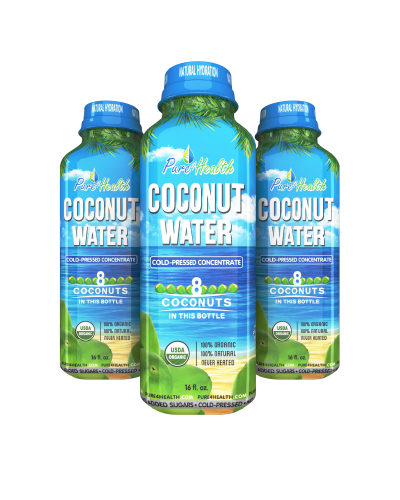Sriphala
Published: Wed, 02/22/17
February 22, 2016
Sriphala Devin Nielson

In South Asia, coconuts are called “sriphala” or fruit of the gods. They symbolize complete usefulness, selfless service, prosperity and generosity. Coconuts also play an essential role in many religious and social functions. Due to its many uses, the Coconut has been called the Swiss Army knife of the plant kingdom. The meat, water, fiber and shell have all been used in a multitude of ways for as long as man has been on earth. This versatility is still evident today
in countless, coconut based, products from food to cosmetics.
Two distinct branches of coconut are responsible for the numerous varieties of coconuts found all over the world. As an example of this diversity, there are over 15 different varieties in the small country of Sri Lanka alone. The flavor and quality of a coconut is highly dependent on the soil where it is grown. Thailand has proven to grow the sweetest and best tasting fresh coconuts found anywhere in the world.
Did you know that Coconuts are not even nuts? Coconuts are drupes in the same family as peaches, plums and cherries. Not every coconut contains the delicious and nutritious water that is expected when cracked open. It takes a professional eye, ear, and feel to know if a coconut’s water is ready for drinking.
Coconut water is very delicate and easily spoils. Unfortunately, it is quite difficult and expensive to ship coconuts in fresh form to areas of the world where coconuts do not grow in abundance. There is a growing debate over the canning of coconut water and its effects on the taste, vitamins, minerals, electrolytes, enzymes, amino acids, cytokine and phyto-hormones found in a fresh coconut.
Research studies suggest that cytokinins in coconut water have significant anti-aging, anti-carcinogenic and anti-thrombotic (anti-clot formation) effects. The bioactive enzymes which include acid phosphatase, catalase, dehydrogenase, diastase and peroxidase help in digestion and metabolism. The naturally occurring electrolytes in coconut water are so significant that over the past few years coconut water has been called “nature’s Gatorade.”
What are electrolytes and why are they so important? Electrolytes are salts that become charged molecules, called ions, when they are dissolved in a liquid. Their electrical charges and ability to conduct electricity helps the body to send electrical signals from one cell to another. Some of these electrolytes include potassium, magnesium, calcium and phosphate and are all found naturally in coconut water.
These electrolytes maintain the electric voltage throughout your cells so that signals can pass easily. Nerve and muscle functions as well as acidity and fluid levels rely on electrolytes to function and an imbalance can have dire consequences.
The balance of electrolytes in your body can easily change. Electrolytes can be found and replaced through a well-balanced diet rich in veggies and fruit or coconut water. One serving of coconut water can provide as much potassium as 2 bananas and is easier to digest and assimilate into the body.
Coconut Water is best when it is consumed in its freshest form. Come visit us at www.pure4health.com to learn how you can partake of the closest thing to a fresh coconut.
Devin Nielson is one of the founders of Pure 4 Health Co., an innovative leader in affordable fresh frozen juices. FRESH IS BEST!!
Printable Version: http://herballegacy.com
If you missed an article be sure to visit http://www.herballegacy.com and click on Articles. Also, take advantage of David Christopher's Radio Show (see Resource Links below for more information).
David Christopher is now on Twitter!
You can follow David @DChistopherMH

1 cup coconut water
1/2 cup pineapple juice
1/16 teaspoon real salt or sea salt
Mix and enjoy.
Compare this drink to the popular sports drink:
Natural Energy Drink
Sodium = 167 mg (Remember this is from natural sources not added sodium.)
Potassium = 575 mg
Carbohydrates = 27 mg
Sports Drink
Sodium = 110 mg
Potassium = 30 mg
Carbohydrates = 14 mg
Recipe from the School of Natural Healing
Printable Version: http://www.herballegacy.com
Herbal Resource Links
- Herbal Legacy - http://www.herballegacy.com - Our free information website
- The School of Natural Healing - http://www.snh.cc - Quality Education since 1953
- Christopher Publications - http://www.christopherpublications.com - Dr. Christopher's books and more
- Christopher Websites - http://www.christopherwebsites.com - Find all Christopher websites and other great resources
- A Healthier You Radio Show - http://www.ahealthieryouradio.com - Free weekly radio show
The School of Natural Healing: http://www.snh.cc
Christopher Publications: http://www.christopherpublications.com
NOTICE: All information in this newsletter is given out as information only and is not intended to diagnose or prescribe. For our official Disclaimer, Biological Individuality, Important Notice & Terms of Use please see: http://www.herballegacy.com/Disclaimer.html
This newsletter is sent by permission only - you can unsubscribe quickly and easily by clicking the link below.
.

